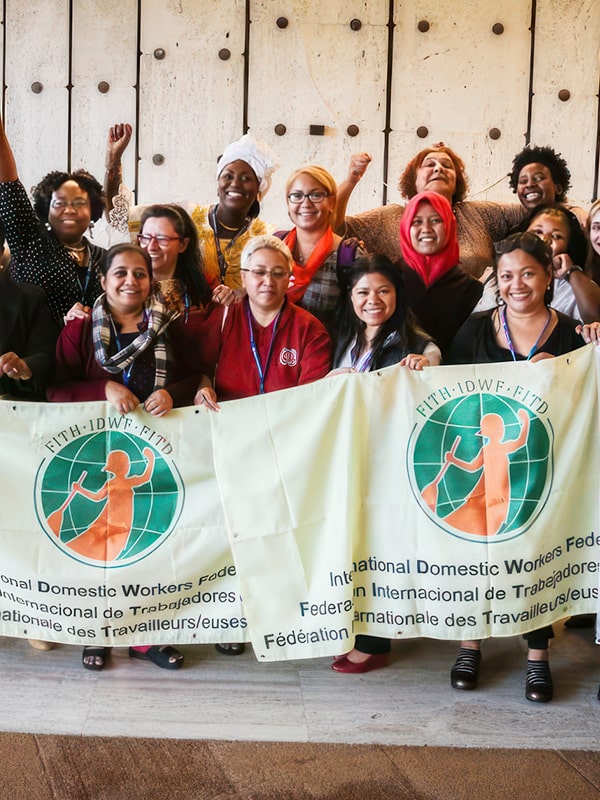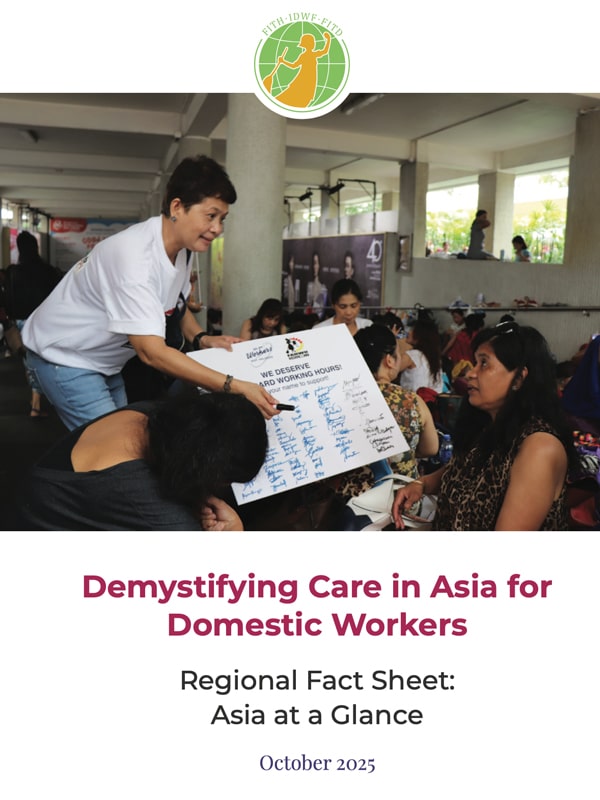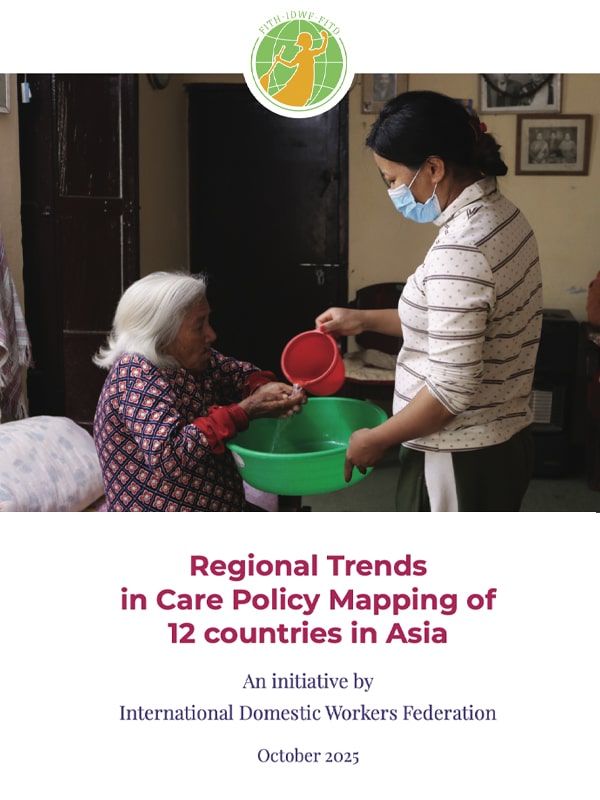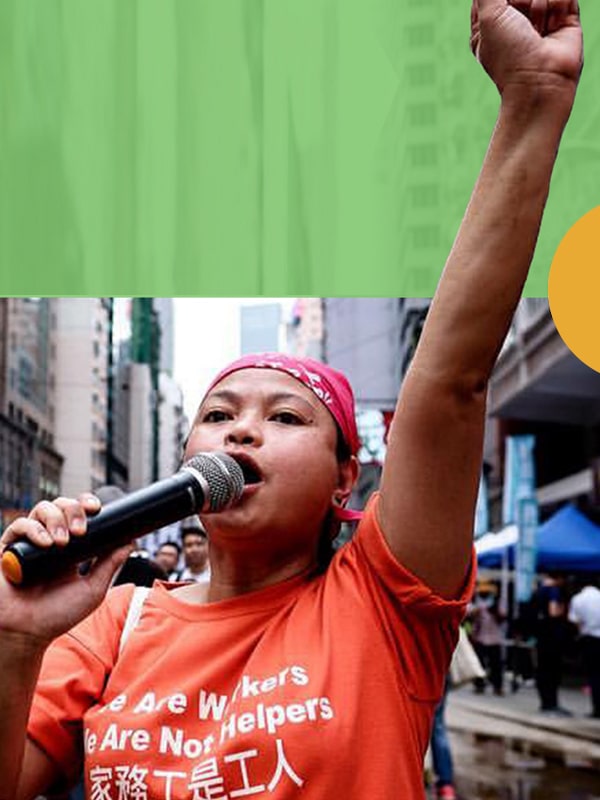There is no doubt that the consequences of climate change are severe and potentially catastrophic. Reverting the current trend is essential for our planet and for future generations. The world urgently needs a global transition towards a low-carbon and sustainable economy. But how to build a transition that leaves no one behind? The participation of the world of work is critical to developing just transition frameworks that ensure decent work, social justice, and gender equality. And the inclusion of domestic workers as the backbone of care systems and key agents of change is mandatory.

Policies to respond to climate change have relevant implications for the world of work, leading to the elimination and transformation of some jobs, and the creation of new jobs. Managed well, the greening of economies can offer many opportunities to achieve social objectives, as an engine of growth and a generator of new decent jobs that can contribute significantly to poverty eradication and social inclusion. But, without a just transition, economic changes could disrupt production and labor markets, and result in increased social inequality.
Thus, sustainable development is only possible with the active engagement of the world of work. Just transition frameworks must be co-developed by governments, employers, and workers, not only with the aim of saving the planet for present and future generations, but also of eradicating poverty and promoting social justice.
Domestic workers, a workforce composed of almost 80 million people worldwide – of which over 76% are women -, play a central role in economies and societies. However, most of them work in informal conditions, are excluded from social and labor protections, and have low wages. Paradoxically, those who are the backbone of care systems are also the most vulnerable group. Climate change has a significant impact on the work and lives of domestic workers, particularly those in the Global South, that on an individual scale carry the burden of countering effects of “high-carbon” major economies such as pollution; food, natural resources and basic services shortage, increasing urbanization, and affordable and decent housing scarcity, among others. Domestic workers have said it loud and clear: Climate change is a labor issue!
As a result of rising temperatures and extreme weather events, they are often exposed to increased physical and mental health risks, especially in regions with poor infrastructure and limited access to basic services such as water, electricity, and healthcare. Plus, it is more difficult for domestic workers than for other workers to recover from the effects of environmental disasters that lead to resource scarcity, displacing and pushing many of them, mainly those in rural areas, to migrate to urban areas or to cross borders in search of work. To make things worse, as public services fail to meet domestic workers’ needs, climate disasters increase their care burdens.
Most domestic workers also work long hours in households that lack proper ventilation or cooling, and are constantly exposed to chemical hazards, with no occupational health and safety, which leads to an increase in different illnesses. Additionally, they often have to travel longer distances to access work, which exposes them to greater risks from climate change-related disasters such as floods, landslides, and storms.
At last, but not least, domestic workers are particularly vulnerable to the effects of climate change due to their marginalized condition, multiple oppressions, and lack of access to social protections (health care, insurance, or savings). Hence, an intersectional approach that takes into account all the characteristics of domestic workers is necessary to fully understand and address the impact of climate change on this group. When it comes to domestic workers, it is also a matter of genre, race, ethnicity, indigeneity, religion, age, disability, migration, and socio-economic status.
The transition to a more sustainable economy has the potential to impact domestic workers both negatively and positively: they may be disproportionately affected during the process, or they may become frontline agents for climate justice. It will depend on how the transition is managed.
If the transition to an “eco-economy” is just, it can bring several benefits to domestic workers: a) Increased demand for green home cleaning services, energy-efficient cooking, and sustainable home maintenance, which could create new job opportunities for domestic workers with these skills; b) Domestic workers who are trained in sustainable practices (recycling, waste management, composting organic materials, eco-friendly cleaning, sustainable food management, organic gardening, etc.) could see an increase in their wages or have more bargaining power in the labor market; c) The adoption of renewable energy, energy-efficient technologies, and green cleaning products could lead to a reduction in occupational risks for domestic workers, who spend long hours working indoors; d) The increase in demand for care services will lead to the implementation of more equitable and efficient national care systems, with domestic workers playing a central role and accessing good-quality jobs.
But if the shift to a green economy is not well conducted, with insufficient support or tools for domestic workers to adapt and thrive in the new economy, they will face severe challenges: a) As a result of the transition, some may lose their jobs or face a reduction in their working hours and their income, particularly if their employers can no longer afford their services or if their work is replaced by automation or new technologies; b) The transition could increase competition in the domestic labor market, which could lead to lower wages and poorer working conditions for some domestic workers, especially for those who are not trained in new skills that are required in the low-carbon economy; c) If domestic workers are not included in the planning and implementation of the transition, their rights and necessities may be put aside, increasing their informality and vulnerability; d) Automation technologies adopted in the transition process can contribute to the informalization of domestic work, as platforms and apps that connect clients with domestic workers may offer limited legal protections, benefits, or job security, leading to precarious working conditions.
Therefore, all policymakers and stakeholders must implement a just transition approach for domestic workers considering the following key aspects:
- The huge contribution of domestic workers to economies and societies must be recognized. All policies need to be coherent and comprehensive, addressing Convention 189 and fostering the creation of more decent jobs for domestic workers.
- Domestic workers need to be protected from job losses during the transition. This could involve policies and programs that support the creation of new green jobs in the domestic sector, or that provide financial support to domestic workers who are temporarily unemployed or underemployed during the transition.
- The COVID-19 crisis underscored domestic workers’ lack of access to social protection, exacerbating poverty and inequalities. So, for a just transition, it’s key to identify and understand new challenges, and formulate social protection measures that protect existing benefits and take into account emerging social needs.
- The pandemic has also exposed the lack of occupational safety and health policies for domestic workers. Governments, in consultation with social partners, must map increased or new OSH risks for our sector resulting from climate change, and implement adequate prevention/protection measures and standards.
- Domestic workers must be provided with training and reskilling programs to learn new skills related to the green economy. This would increase their bargaining power and earning potential through professionalization.
- According to ILO (2022), “climate change has gendered effects and exacerbates pre existing gender-inequalities in the world of work”. Thus, climate policies should include targeted measures to support women experiencing intersectional forms of discrimination, like domestic workers. This would not only minimize social, economic, and environmental risks and support greater inclusion, but also strengthen climate mitigation and adaptation efforts through the empowerment of women domestic workers as key agents of change.
- Investing in the care sector is essential for ensuring more resilient economies and societies in a changing climate. The demand for care services, often provided by domestic workers, increases due to climate change and disasters. An ILO study (2022) shows that addressing existing significant gaps in care services could generate nearly 300 million jobs.
- There is no “one size fits all.” Policies and programs must be designed in line with the specific conditions of domestic workers. Unions, through collective bargaining and social dialogue, must play an active role in the formulation, implementation, and monitoring of just transition frameworks.
Just transition means greening the economy in a way that is fair and inclusive of everyone concerned, creating decent work opportunities, and leaving no one behind, including domestic workers. They, as agents of change, must be ahead of a fair and equitable transition for everyone. At the end of the day, no automation process or green technology can replace domestic workers. Their invaluable contribution to societies and economies makes them irreplaceable.
Download







